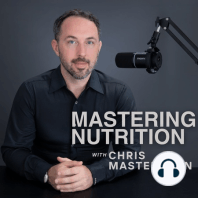35 min listen

What causes low white blood cell count and what can you do about it? | Masterjohn Q&A Files #01
What causes low white blood cell count and what can you do about it? | Masterjohn Q&A Files #01
ratings:
Length:
2 minutes
Released:
Nov 4, 2019
Format:
Podcast episode
Description
Nutritional causes of low white blood cells and possible solutions? The absolute first thing that I would always think of when I see low white blood cells is copper. So, generally copper deficiency at its most sensitive is going to cause neutropenia; which is low neutrophils, but it can cause low white blood cells across the board. I'm not saying there aren't other things, but that's going to be the number one thing that I jump to first when looking for low white blood cells. Solutions, well, I'm not going to assuming it's copper. What I'm going to say is, do we have copper here? So, the first thing is testing serum copper, or serum ceruloplasmin. Which are the two most important markers of copper status. Is the individual eating copper-rich foods? Top Tier: Liver, oysters, shitake mushrooms, spirulina, and cocoa powder. Second Tier: All other organ meats other than liver, all other mushrooms besides shitake, all other shellfish besides oysters. Third Tier: Legumes, and potatoes. First I want to know if they are eating any of the top two tier copper-rich foods. If the answer is no, then I'm not going to wait on the serum copper and serum ceruloplasmin. I would suggest increasing the copper-rich foods because there is absolutely no harm in modifying the foods you eat to ensure you’re getting some in there. You don't really need the testing to do that. But I would definitely get the testing before I would start doing any bigger interventions than that. For example, I'm not going to start that person on a copper supplement if I don't have good data backing up copper deficiency. This Q&A can also be found as part of a much longer episode, here: https://chrismasterjohnphd.com/podcast/2019/02/09/ask-anything-nutrition-feb-1-2019/ If you would like to be part of the next live Ask Me Anything About Nutrition, sign up for the CMJ Masterpass, which includes access to these live Zoom sessions, premium features on all my content, and hundreds of dollars of exclusive discounts. You can sign up with a 10% lifetime discount here: https://chrismasterjohnphd.com/q&a
Released:
Nov 4, 2019
Format:
Podcast episode
Titles in the series (100)
006: Why "Glycation" Is a Bad Reason to Restrict Carbs: In this episode, I respond to a listener's question aboutwhether glycation is a good argument against a high-carbohydratediet. I agree that we should avoid refined carbs and emptycalories, but in this episode I describe why "glycation" is reallya... by Mastering Nutrition